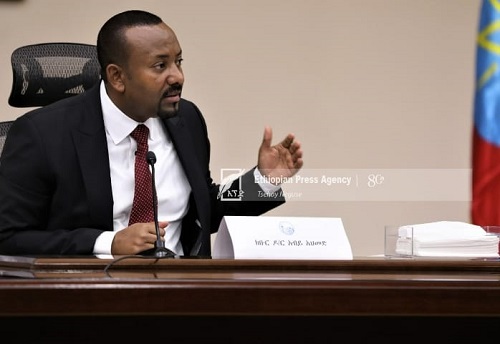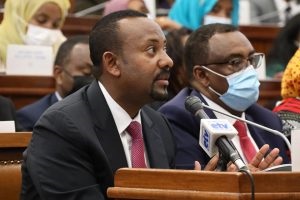
BY ABDUREZAK MOHAMMED
Article 55 (17) of the Constitution of the Federal Democratic Republic of Ethiopia (FDRE) stipulates that the House of Peoples’ Representatives has the power to call and question the Prime Minister and other Federal officials and to investigate the Executive’s conduct and discharge of its responsibilities.
Last Monday, Prime Minister Abiy Ahmed (PhD) appeared before the MPs to address queries of the parliamentarians in connection with Ethiopia’s 2014 fiscal year budget and the current situation of Ethiopia.
It was also learnt that the session was attended by high-level government officials, religious fathers, diplomats of various countries, as well as representatives of political parties and international and local institutions, and other guests of honor.
During the session, members of the parliament (MPs) raised various questions to the premier for an explanation. The questions and comments of the MPs mainly focused on the 2014 Ethiopian fiscal year budget, the government’s plan to lessen the high cost of living, the current situation of Tigray regional state, and the withdrawal of the Ethiopian National Defence Force (ENDF) from the region, external forces pressure on Ethiopia in connection with the current situation of the country, the construction of the Grand Ethiopian Renaissance Dam (GERD), diplomatic activities of Ethiopia and their outcomes, among others. Premier Abiy addressed MPs’ queries by categorizing them into two – economic and political issues.
Addressing economic issues in the first part, Abiy stated that there were a lot of challenges that hindered the country’s economic growth like a swarm of locusts, flood, and conflicts in many parts of the country, as well as the coronavirus pandemic and rising commodity prices in global market.
Despite these problems that have challenged Ethiopia’s economy in the 2013 Ethiopian fiscal year, the country’s export trade shows an eighteen percent increment and the country secured 3.5 billion USD from this, he said, adding that the import-export trade balance has been narrowed year by year. “It was 14.6 percent in the 2011 Ethiopian fiscal year, down from 9.3 percent this year.”
According to him, the work that has been done to narrow the import-export trade balance is encouraging, but it requires more effort. Foreign direct investment has grown by 20 percent. The initiative of the regions in providing land for investment is commendable, he further stated.
Explaining the work done by the government to reduce the high cost of living and improve the life of Ethiopians, the Premier noted that the government is working to keep inflation in check. He added that the gap between supply and demand can lead to inflation. The government will check the supply chain. “Efforts are being made to crack down on illegal traders,” he said.
As to him, the government is allocating large sums of money for the adequate supply of food in the country by strengthening consumer associations, improving the supply chain, and encouraging the private sector to import food products in Franco Valuta. And also, the government itself is importing food items such as wheat and oil. However, inflation could not be controlled as required.
“In addition to Addis Ababa, bread factories will be built in major regional cities and efforts will be made to lessen the inflation by increasing wheat productivity,” he indicated. He further stated that consumer associations shall get strong. And, the whole supply chain shall be improved as well. “Enhancing production and productivity remain core issues to alleviate the inflation challenge across the nation,” he said.
Addressing questions of MPs in connection with the GERD, Premier Abiy said the dam is being built in a way to benefit riparian countries apart from solving Ethiopia’s electricity crisis.
“Despite the barrage of fake news about GERD, the dam is going to reduce Sudan and Egypt’s water security threats as our green campaign will make both countries secure more water than before,” Abiy further noted.
According to him, the dam is crucial to the three countries – Ethiopia, Sudan, and Egypt – and the region as a whole not only in terms of generating power but also solving water shortages via planting billions of seedlings every year.
The Premier also called on the international community to support Ethiopia’s win-win approach to break the deadlock on the GERD talks.
Premier Abiy further indicated that Ethiopia has been negotiating with Sudan and Egypt in good faith to resolve the issue once for all and the downstream countries have to demonstrate the same commitment to come up with a win-win solution instead of involving in fruitless and time-consuming arguments.
Addressing MPs questions regarding the current situation of Tigray regional state, the declaration of a unilateral ceasefire by the federal government, and the evacuation of the Ethiopian National Defence Force (ENDF), Prime Minister Abiy stated that the main aim of the federal government’s recent unilateral decision to cease active military operation in the region is to thwart the desires of interest groups wanting a protracted war in Ethiopia.
There are widespread baseless rumors about the federal government’s unilateral ceasefire and the withdrawal of the ENDF from Tigray, the Premier said, adding that the decision aimed to enable the government to face priority national agendas and to give the people of Tigray the opportunity to consider situations thoughtfully.
As to him, the decision was made to enable the government to focus on rehabilitating internally displaced people because of conflicts in different parts of the country, controlling the spread of coronavirus (COVID-19) pandemic, completing ongoing projects, and rehabilitating returnees. It is also aimed to get the farmers in the region back to their farm because now is the rainy season, he added.
The premier further noted that the federal government declared a unilateral ceasefire in Tigray by taking into account the experiences of Ukraine, Korea, and other countries that have undergone similar problems. “The extraction of the army from the region was carried out in four phases after consultations with various pertinent stakeholders,” he indicated.
He reported that since the federal government started a law enforcement operation in the region, it has spent more than 100 billion Birr (more than 2 billion USD) to rebuild the region.
Explaining the country’s diplomacy activities, Abiy said Ethiopia shouldn’t have 60 or so embassies and consulates given the current situation of the country. He added that at least 30 of them should be closed and the ambassadors should be here.
Meanwhile, the House of Peoples’ Representatives, in its 6th year 4th extraordinary meeting, approved unanimously the 561.67 billion Birr budget for 2014 (2021/22) Ethiopian fiscal year as proclamation no. 1254/2013. The approved budget has 18 percent compared to the 2013 Ethiopian fiscal year’s budget.
Out of the total 561.67 billion Birr budget, 162 billion Birr is allocated for recurrent spending, 183.5 billion Birr for capital expenditure, 203.95 billion Birr for the subsidy to regions, and 12 billion Birr for sustained development goals, it was also revealed.
The Ethiopian Herald July 11/2021


